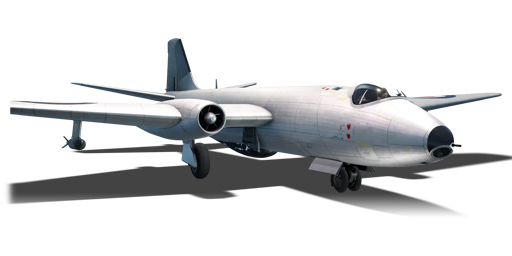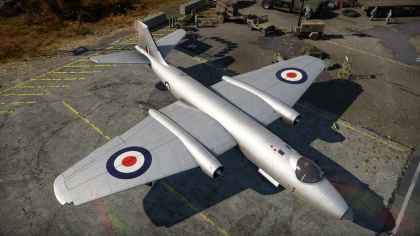Difference between revisions of "Canberra B (I) Mk 6"
m (→Details: Updated template to preferred type) |
FantePhala (talk | contribs) m (→Pros and cons: Added line on reduced bomb load) (Tag: Visual edit) |
||
| Line 85: | Line 85: | ||
|- | |- | ||
! colspan="3" | Engine characteristics | ! colspan="3" | Engine characteristics | ||
| − | ! colspan="5" | Mass with fuel (no weapons load) || rowspan="2" | Max Takeoff<br/>Weight | + | ! colspan="5" | Mass with fuel (no weapons load) || rowspan="2" | Max Takeoff<br />Weight |
|- | |- | ||
! Weight (each) || colspan="2" | Type | ! Weight (each) || colspan="2" | Type | ||
| Line 102: | Line 102: | ||
| 0.53 || 0.52 || 0.48 || 0.43 || 0.38 || 0.26 | | 0.53 || 0.52 || 0.48 || 0.43 || 0.38 || 0.26 | ||
|- | |- | ||
| − | | ''Optimal'' || 3,300 kgf<br/>(0 km/h) || N/A | + | | ''Optimal'' || 3,300 kgf<br />(0 km/h) || N/A |
| 0.53 || 0.52 || 0.48 || 0.43 || 0.38 || 0.26 | | 0.53 || 0.52 || 0.48 || 0.43 || 0.38 || 0.26 | ||
|- | |- | ||
| Line 208: | Line 208: | ||
* Large surface area | * Large surface area | ||
* High speed makes it hard to bomb smaller targets such as tanks | * High speed makes it hard to bomb smaller targets such as tanks | ||
| + | * Loss of one 1000lb bomb in regards to previous model [[Canberra B Mk 2|Canberra B Mk2]] | ||
== History == | == History == | ||
Revision as of 00:30, 30 May 2020
Contents
| This page is about the British jet bomber Canberra B (I) Mk 6. For other uses, see Canberra (Family). |
Description
The Canberra B (I) Mk 6 is a rank V British jet bomber
with a battle rating of 9.0 (AB), 8.3 (RB), and 8.0 (SB). This aircraft was introduced in Update 1.45 "Steel Generals".
The Canberra B (I) Mk.6 is an interdiction model of the famous bomber, thus it is more suited for aggressive ground attack/interdiction roles by comparison to the B Mk.2 or B-57A models. Much like the B-57B, it retains its bomb carrying capabilities, but also features and impressive battery of armament consisting of 4 x 20 mm Hispano Mk V cannons. Not only this, but the B (I) Mk.6 has a 2000 round capacity for these cannons, making it a truly formidable attack aircraft and also allowing for air-to-air combat with other aircraft. Unlike the previous B Mk.2 model, due to the incursion of a gun pack to house the cannon armament, the B (I) 6 features wing mounted pylons to carry similar ordinance options to the previous model of Canberra. This makes the B (I) one of the most effective and versatile attack aircraft in game due to its ability to switch from conventional bombing, to ground attack and also interception.
General info
Flight Performance
| Characteristics | Max Speed (km/h at 3,000 m) |
Max altitude (metres) |
Turn time (seconds) |
Rate of climb (metres/second) |
Take-off run (metres) | |||
|---|---|---|---|---|---|---|---|---|
| AB | RB | AB | RB | AB | RB | |||
| Stock | 859 | 832 | 12192 | 26.6 | 27.4 | 13.9 | 11.9 | 750 |
| Upgraded | 894 | 880 | 25.5 | 26.0 | 26.9 | 20.0 | ||
Details
| Features | |||||
|---|---|---|---|---|---|
| Combat flaps | Take-off flaps | Landing flaps | Air brakes | Arrestor gear | Drogue chute |
| ✓ | ✓ | ✓ | ✓ | X | X |
| Limits | ||||||
|---|---|---|---|---|---|---|
| Wings (km/h) | Gear (km/h) | Flaps (km/h) | Max Static G | |||
| Combat | Take-off | Landing | + | - | ||
| 0 | 450 | 520 | 520 | 320 | ~4 | ~2 |
| Optimal velocities (km/h) | |||
|---|---|---|---|
| Ailerons | Rudder | Elevators | Radiator |
| < 590 | < 550 | < 500 | N/A |
Engine performance
| Engine | Aircraft mass | |||||||
|---|---|---|---|---|---|---|---|---|
| Engine name | Number | Empty mass | Wing loading (full fuel) | |||||
| Rolls-Royce Avon Mk.109 | 2 | 10,300 kg | 194 kg/m2 | |||||
| Engine characteristics | Mass with fuel (no weapons load) | Max Takeoff Weight | ||||||
| Weight (each) | Type | 18m fuel | 20m fuel | 30m fuel | 45m fuel | 62m fuel | ||
| 800 kg | Axial-flow turbojet | 12,363 kg | 12,586 kg | 13,699 kg | 15,368 kg | 17,260 kg | 25,865 kg | |
| Maximum engine thrust @ 0 m (RB / SB) | Thrust to weight ratio @ 0 m (100%) | |||||||
| Condition | 100% | WEP | 18m fuel | 20m fuel | 30m fuel | 45m fuel | 62m fuel | MTOW |
| Stationary | 3,300 kgf | N/A | 0.53 | 0.52 | 0.48 | 0.43 | 0.38 | 0.26 |
| Optimal | 3,300 kgf (0 km/h) |
N/A | 0.53 | 0.52 | 0.48 | 0.43 | 0.38 | 0.26 |
Survivability and armour
- No armour plating
- No armour glazing
- Critical components located at the fuselage of the aircraft (fuel, pilot, controls)
- Engines in wings
Armaments
Offensive armament
The Canberra B (I) Mk 6 is armed with:
- 4 x 20 mm Hispano Mk V cannon, belly-mounted (500 rpg = 2,000 total)
Suspended armament
The Canberra B (I) Mk 6 can be outfitted with the following ordinance"
- 2 x G.P. 500 lb Mk.IV bombs + 3 x G.P. 1000 lb Mk.I bombs
- 3 x G.P. 500 lb Mk.IV bombs + 2 x G.P. 1000 lb Mk.I bombs
- 5 x G.P. 1000 lb Mk.I bombs
- 5 x G.P. 500 lb Mk.IV bombs
Usage in the battles
Modules
| Tier | Flight performance | Survivability | Weaponry | ||
|---|---|---|---|---|---|
| I | Fuselage Repair | Radiator | |||
| II | Compressor | Airframe | |||
| III | Wings Repair | Engine | |||
| IV | Engine Injection | Cover | |||
Pros and cons
Pros:
- High-speed attack aircraft
- High cannon ammo capacity
- Large bomb-carrying capabilities
- Good agility
Cons:
- No defensive armament
- Large surface area
- High speed makes it hard to bomb smaller targets such as tanks
- Loss of one 1000lb bomb in regards to previous model Canberra B Mk2
History
Describe the history of the creation and combat usage of the aircraft in more detail than in the introduction. If the historical reference turns out to be too big, take it to a separate article, taking a link to an article about the vehicle and adding a block "/ historical reference" (example: https://wiki.warthunder.com/Name-vehicles/historical reference) and add a link to it here using the main template. Be sure to include links to sources at the end of the article.
In-game description
After the runaway success of the first English Electric Canberra variants, further development was an inevitability. A single Canberra B Mk.5 was constructed as a test bed of marrying the airframe with the new, more powerful Rolls-Royce Avon RA7 jet engines with a lengthened fuselage leading to a greater fuel capacity. Trials proved to be successful and the resulting Canberra B Mk.6 entered service with the RAF in 1954.
The B Mk.6 was some 10 mph faster and also saw a range increase from approximately 2600 miles to just under 3400 miles, significantly improving flexibility of operations for RAF Bomber Command.
The B Mk.6 also spawned the development of the interim B(I) Mk.6, which added a ventral pack containing four 20 mm Hispano cannon and an additional two hard points on the wings for external stores. It also included the Low Altitude Bombing System for the release of nuclear weapons in a climb from low altitude. The Canberra saw service with both the RAF, RNZAF and RAAF during the Malayan Emergency. RAF Canberra B Mk.6’s also served alongside the earlier B Mk.2 and Photographic Reconnaissance variants during the Suez Crisis in 1956.
Whilst the Canberra was phased out of service as an RAF front line bomber in the early 1960s it continued to be used for a staggering 50 years in other roles, particularly photographic reconnaissance, and even flew operationally in the 1991 Gulf War. It finally retired from service with the RAF in June 2006. The Canberra saw great success across a number of variants and was exporting to many countries such as Australia, the United States, France, India, New Zealand, Chile, Argentina, West Germany, Venezuela, Sweden, South Africa, Rhodesia, Zimbabwe, Peru, Ecuador and Ethiopia.
Media
An excellent addition to the article will be video guides, as well as screenshots from the game and photos.
Read also
Links to the articles on the War Thunder Wiki that you think will be useful for the reader, for example,
- reference to the series of the aircraft;
- links to approximate analogues of other nations and research trees.
Sources
Paste links to sources and external resources, such as:
- topic on the official game forum;
- page on aircraft encyclopedia;
- other literature.
| The English Electric Company Limited | |
|---|---|
| Jet Fighters | Lightning F.6 · Lightning F.53 |
| Jet Bombers | Canberra B Mk 2 · Canberra B (I) Mk 6 |
| Tanks | Excelsior |
| The English Electric Company allowed the Glenn L. Martin Company to license-build Canberra bombers for the United States Air Force. | |
| Britain jet aircraft | |
|---|---|
| Blackburn | Buccaneer S.1 · Buccaneer S.2 · Buccaneer S.2B |
| British Aerospace | Harrier GR.7 · Sea Harrier FRS.1 (e) · Sea Harrier FRS.1 · Sea Harrier FA 2 |
| British Aircraft Corporation | Strikemaster Mk.88 |
| English Electric | Canberra B Mk 2 · Canberra B (I) Mk 6 · Lightning F.6 · Lightning F.53 |
| Gloster | Meteor F Mk 3 · Sea Meteor F Mk 3 · Meteor F Mk 4 G.41F · Meteor F Mk 4 G.41G · Meteor F Mk 8 G.41K · Meteor F Mk.8 Reaper |
| Javelin F.(A.W.) Mk.9 | |
| de Havilland | Vampire F.B.5 · Venom FB.4 · Sea Venom FAW 20 · Sea Vixen F.A.W. Mk.2 |
| Hawker | Sea Hawk FGA.6 · Hunter F.1 · Hunter F.6 · Hunter FGA.9 · Harrier GR.1 · Harrier GR.3 |
| Panavia | Tornado GR.1 · Tornado GR.4 · Tornado F.3 · Tornado F.3 Late |
| SEPECAT | Jaguar GR.1 · Jaguar GR.1A · Jaguar IS |
| Supermarine | Attacker FB 1 · Attacker FB.2 · Scimitar F Mk.1 · Swift F.1 · Swift F.7 |
| Foreign | Phantom FG.1 (USA) · Phantom FGR.2 (USA) · F-4J(UK) Phantom II (USA) |
| Australia | F-111C |
| India | ▄MiG-21 Bison |
| South Africa | ▄JAS39C |





